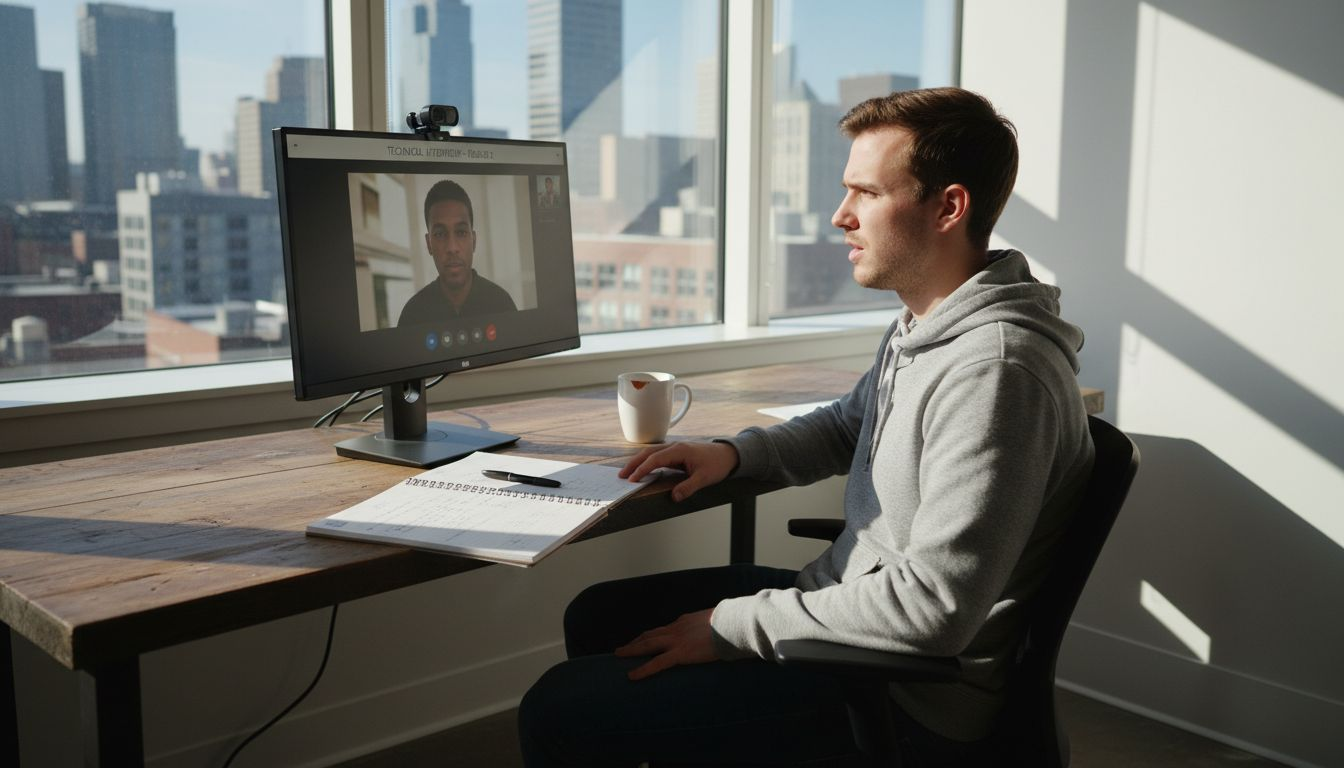How to Answer Phone Interview Questions & Ace Your Interview
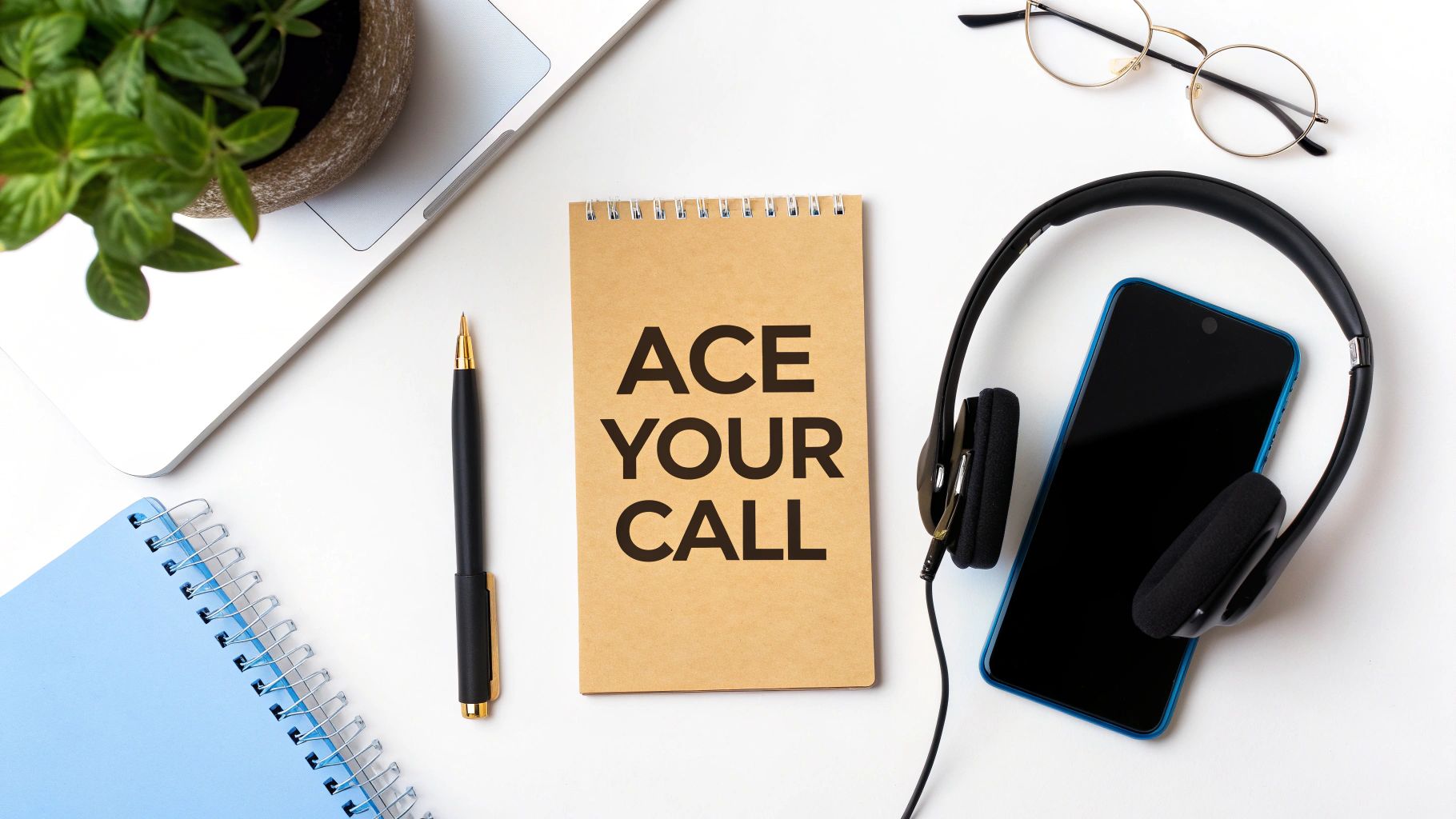
The secret to nailing your phone interview isn’t some hidden trick. It's really about a powerful combination of solid preparation, speaking clearly, and leaving a great impression with a thoughtful follow-up. This first call is a serious filter, and they’re testing your professionalism just as much as your qualifications.
Why Your Phone Interview Matters More Than You Think

It’s tempting to write off a phone screen as a low-key formality—just a quick chat before the "real" interview. That mindset is a huge mistake. Don't think of it as a hurdle to jump; see it as the first and most important gate you need to pass through.
Recruiters use these 15-30 minute calls to quickly sort through a massive pile of applications. They’re making snap judgments about who gets to the next round.
Since they can't see your body language or get a feel for you in person, your voice has to do all the heavy lifting. Your tone, how clearly you speak, and the confidence you project are painting a picture of who you are as a professional. This is your chance to prove you can get your point across and handle a professional conversation.
The Numbers Behind the Call
Phone interviews are still a massive part of hiring today. A LinkedIn poll actually found that 60% of job applicants had at least one phone interview during their search. When you consider that Bureau of Labor Statistics data suggests people get about one interview for every six applications, you can see how crucial it is to get this stage right. You can dig deeper into these trends with these job interview statistics.
This initial call is about way more than just confirming what’s on your resume. The interviewer is listening for a few key things:
- Communication Skills: Can you organize your thoughts and present them in a way that makes sense?
- Professionalism: Do you sound like you’re taking this seriously? Are you engaged and respectful of their time?
- Genuine Interest: Did you bother to research the company and the role? Or are you just winging it?
- Personality and Culture Fit: Do you sound like someone they’d actually want to work with every day?
A successful phone interview hinges on demonstrating enthusiasm and preparedness from the moment you say "hello." The interviewer is listening for energy and confidence, not just answers.
If you don't take it seriously, you’re almost guaranteed to get screened out before you even get a chance to meet the hiring manager. But if you crush this first conversation, you build incredible momentum that can carry you through the entire process.
To give you a roadmap, here's a quick look at the key elements we'll be covering to help you prepare.
Phone Interview Success Checklist
| Phase | Key Action | Why It Matters |
|---|---|---|
| Preparation | Research the company & role. | Shows genuine interest and helps you ask smart questions. |
| Setup | Find a quiet spot with good reception. | Eliminates distractions and ensures clear communication. |
| Execution | Speak clearly, smile, and stand up. | Projects confidence and energy through your voice alone. |
| Follow-Up | Send a personalized thank-you note. | Reinforces your interest and leaves a lasting positive impression. |
Treating this call as the strategic opportunity it is positions you as a top candidate worth their time and investment. It’s your first, best chance to prove you're the right person for the job.
Prepare Your Space and Your Strategy
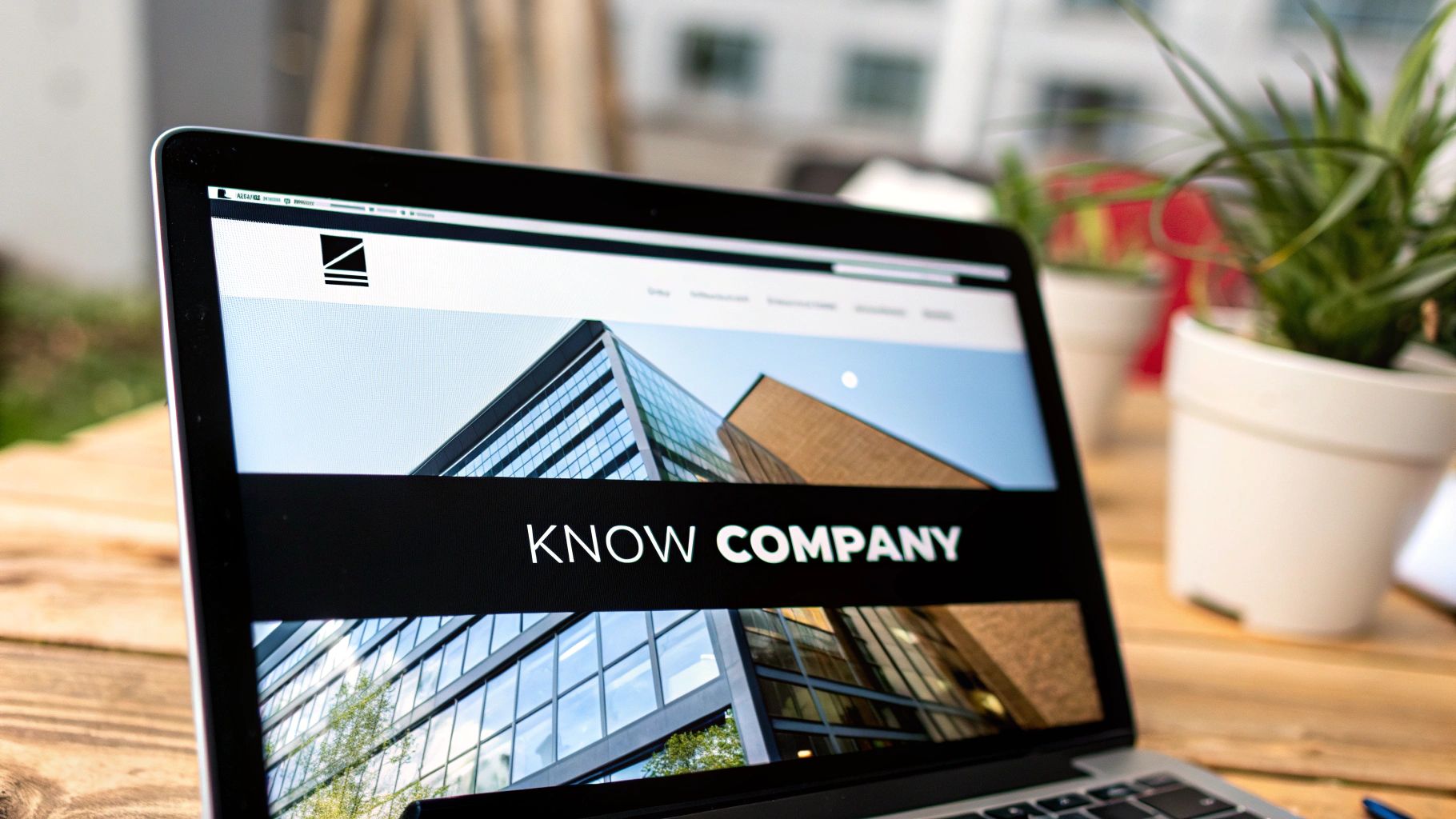
Acing a phone interview starts long before you ever pick up the phone. It's all about setting the stage—both your physical space and your mental game plan—so you can be at your absolute best. This is more than just finding a quiet room; it's about building your own personal command center for the call.
Think about it: your environment has a huge impact on your focus and even how you sound. A cluttered, noisy space leads to a scattered mind, and believe me, an interviewer can hear that distraction in your voice. Your goal here is to get rid of anything that could possibly pull your attention away from the conversation.
Creating Your Interview Command Center
Let’s start with the physical setup. Find a spot where you know you won't be interrupted by family, pets, or the delivery guy. Just as important, check your cell service. A dropped call is the last thing you need, as it adds stress and can make you look unprepared. If you have a landline, even better.
With your space secured, get your digital desktop organized. You’ll want a few key documents pulled up and ready to go:
- Your Resume: Have it right in front of you. You should be able to instantly recall and expand on any detail with a solid example.
- The Job Description: Keep it handy. This lets you use the same language as the company and directly tie your experience to what they're looking for.
- Company Research: Your notes on the company’s mission, latest news, or big projects should be a click away.
- Your Questions: A smart list of questions for the interviewer proves you're engaged and seriously considering the role.
Getting your space in order is really a sign of respect for the interviewer's time. A quiet, organized setup shows them you’re professional, serious, and giving them your full attention.
Projecting Confidence Through Your Voice
In a phone interview, your voice is everything. Without being able to see your body language or a confident handshake, the interviewer is relying completely on your tone, pace, and clarity. A flat, hesitant voice can easily come across as a lack of confidence or, worse, a lack of interest.
Here’s a simple trick I swear by: stand up during the call. Standing naturally opens up your diaphragm, helps you breathe better, and adds a ton of energy to your voice. It’s a small change that makes a huge difference compared to being slouched in a chair.
Another great tip? Smile while you talk. It might feel a little silly since they can't see you, but it genuinely changes the quality of your voice. You'll sound more positive, friendly, and engaged. They can absolutely hear a smile.
Going Deeper Than Surface-Level Research
Your prep work has to go beyond just skimming the company's "About Us" page. The candidates who truly stand out are the ones who understand the company’s pain points and can frame themselves as the solution.
Put on a consultant hat for a minute and ask yourself:
- What are the big-picture challenges happening in this industry right now?
- Looking at the job description, what specific problem is this role trying to solve?
- Where in my past experience have I solved a similar problem?
For instance, if the job description repeatedly mentions "improving efficiency," you need a story ready. Talk about that time you streamlined a workflow and cut project turnaround time by 15%. When you can draw a straight line from your achievements to their needs, you stop being just another applicant and start looking like the obvious choice. This is how you learn how to answer phone interview questions in a way that truly resonates.
Crafting Answers That Make an Impact
When you’re on a phone interview, your words have to do all the heavy lifting. Without body language or eye contact to help you connect, rambling is the fastest way to lose the interviewer’s attention.
The secret is to learn how to answer questions with clarity and impact. It’s a delicate balance; you don’t want to drone on, but answers that are too short can make you sound uninterested or unprepared. You need to land right in that sweet spot where you're telling a focused story that shows off what you can do.
Structuring Your Story with the STAR Method
I've found that the most reliable way to structure these stories is with the STAR method. It's a simple framework that helps you build a compelling narrative around your work experience, ensuring you hit all the key points without sounding like you're reading from a script.
Here’s the breakdown:
- Situation: First, set the scene. Briefly explain the context of the challenge or project.
- Task: Next, what was your specific goal? What did you need to accomplish?
- Action: This is the core of your story. Detail the specific steps you took to tackle the task.
- Result: Finally, what was the outcome? This is where you bring it home. Always use numbers and data to quantify your success whenever you can.
Using this method keeps you from veering off-topic. It forces you to zero in on a specific example and walk the interviewer through it from beginning to end, proving not just what you did, but also why it mattered.
From Generic to Memorable
Let's put this into practice. Say the interviewer asks, "Tell me about a time you had to handle a tight deadline."
A forgettable, generic answer sounds something like this: "I’m used to tight deadlines. I just work harder to get everything done on time." It doesn't really say anything about your skills or how you actually perform.
Now, let's inject the STAR method for a response that will actually stick with them:
(Situation) "In my previous role as a project coordinator, we were two weeks away from a major client marketing campaign launch when a key team member suddenly resigned."
(Task) "My manager asked me to step in and take over their duties, which included getting three critical deliverables back on schedule. The launch date was non-negotiable, so we absolutely could not afford any delays."
(Action) "First, I called a quick huddle with the team to redistribute some of the smaller tasks. Then, I mapped out a new, prioritized timeline in Asana to keep us on track and automated a few of the data reporting tasks to free up our time for more critical work."
(Result) "We ended up completing everything ahead of schedule and the campaign launched smoothly. It was a huge success, generating a 20% increase in leads for the client in its first month. My manager even praised my ability to take charge under pressure."
See the difference? This answer tells a complete story. It showcases specific skills—problem-solving, leadership, tech-savviness—and wraps it all up with a powerful, measurable achievement. That’s how you make an impact.
This visual gives you a great overview of the process for preparing and practicing these kinds of structured answers.
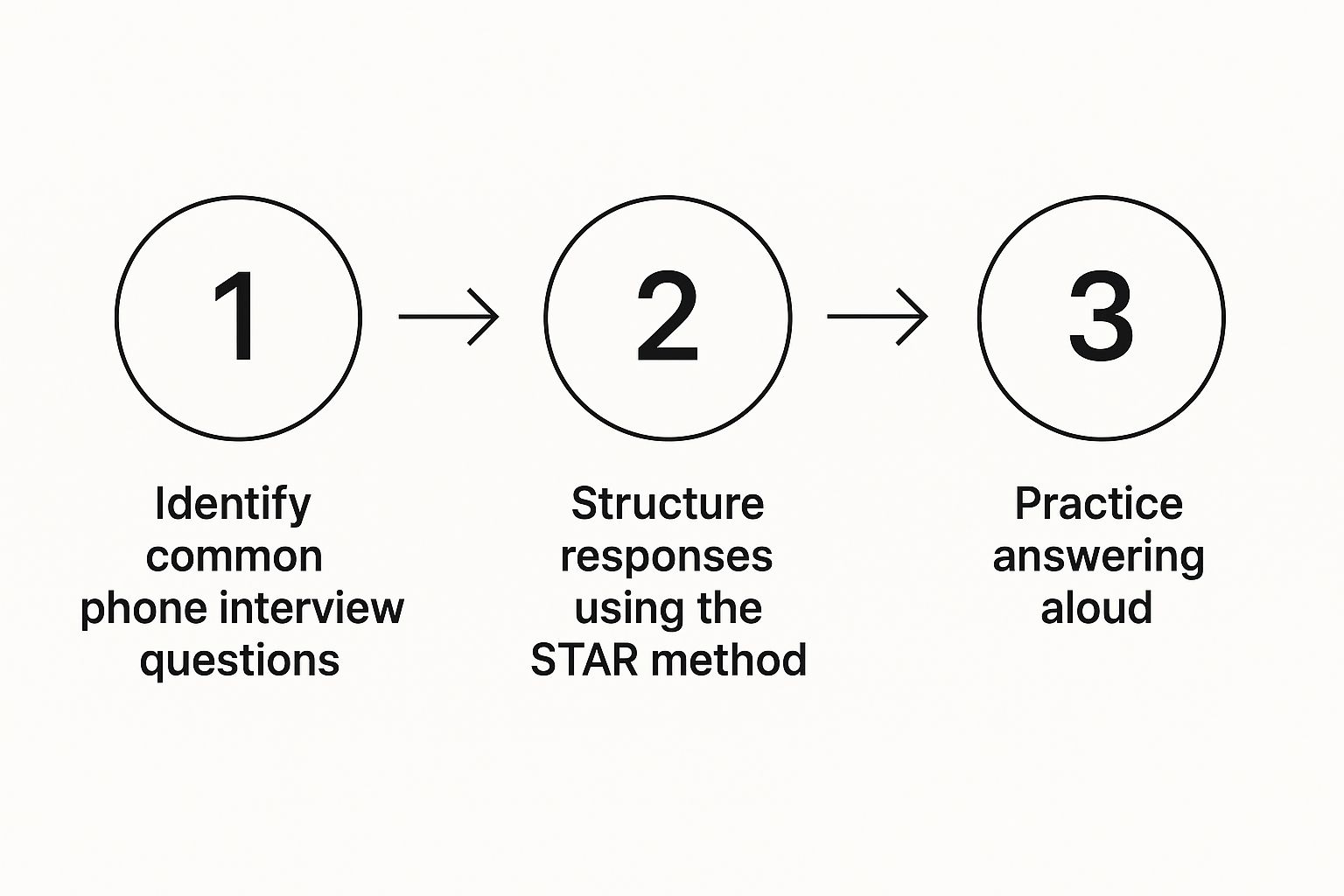
The real takeaway here is that a bit of preparation goes a long way. When you identify likely questions, structure your best stories, and practice them out loud, you build the confidence you need to shine.
Navigating the Most Common Interview Questions
https://www.youtube.com/embed/3rFR-LiFq_U
While you can't read the interviewer's mind, you can bet a few classic questions will pop up. The trick isn't just having a canned answer ready—it's about understanding what they're really asking. This is where you get to connect your story directly to what the company actually needs.
Let's be real: getting to the interview stage is a huge win. The average job post pulls in around 118 applicants, but only about 20% of them—that’s maybe 24 people—actually get a call. You’ve already beaten out a big chunk of the competition. The pressure doesn't stop there, though. Only about one in five of those interviewed will get an offer.
"Tell Me About Yourself"
This one feels like a trap, doesn't it? It’s not an invitation to ramble about your childhood or read your resume back to them. What they're really asking is, "Why are you the perfect fit for this job, right now?" They need a concise, compelling pitch that connects your experience to their problem.
Think of it as your professional trailer. A simple "Present-Past-Future" framework is your best friend here:
- Present: Kick off with your current role and a big win.
- Past: Briefly touch on the key experiences that got you here.
- Future: Tie it all together by explaining why you’re excited about this opportunity.
Here’s what that sounds like in practice:
"Right now, I'm a Digital Marketing Specialist at XYZ Corp, where I just led a campaign that boosted our social media engagement by 30%. Before this, I spent three years at ABC Agency really digging into SEO and content strategy, which set me up to take on a more comprehensive marketing role. I was so excited to see this opening because it's a perfect match for my goal of using data to drive real brand growth."
"Why This Role? Why Our Company?"
Interviewers often ask these two questions back-to-back, and for good reason. They’re sniffing out your true level of interest. Generic fluff like "I need a job" or "Your company seems cool" won't cut it. They want to see that you've done your homework and that this is a deliberate move for you.
To nail this, you need to draw specific connections. Comb through the job description and find responsibilities that genuinely excite you. Then, dig into the company. What have they been up to lately? What's their mission?
Your goal is to build a bridge between their needs and your passions. A powerful answer connects your skills to their mission: "I’ve been following your work in sustainable packaging for a while, and 'Project Green' really caught my eye. My background is in supply chain optimization, where I cut waste by 15%, so this role's focus on efficiency feels like a natural fit for what I love to do and what your company stands for."
The Table: Decoding Common Interview Questions
Before you even pick up the phone, you should have a game plan for the most predictable questions. It's not about memorizing a script, but about understanding the hidden agenda behind each one so you can frame your experience in the best possible light. This table breaks down what they're really trying to figure out and how you can deliver a message that resonates.
| Common Question | What They're Really Asking | Your Answering Strategy |
|---|---|---|
| "Tell me about your greatest weakness." | "Are you self-aware and do you work on self-improvement?" | Acknowledge a real (but not critical) weakness, then show how you're actively working to improve it. |
| "Where do you see yourself in 5 years?" | "Are you ambitious, and do your goals align with a future here?" | Connect your personal growth goals to the opportunities available at their company. Show them you want to grow with them. |
| "Why are you leaving your current job?" | "Are you running from a problem, or are you running toward an opportunity?" | Frame your departure positively. Focus on the pull of the new opportunity, not the push from your old job. |
| "Tell me about a time you failed." | "Can you take responsibility, learn from mistakes, and bounce back?" | Use the STAR method (Situation, Task, Action, Result) to explain a failure, focusing on what you learned from it. |
Thinking through these questions ahead of time helps you stay calm and collected, turning potential stumbling blocks into chances to show off your character and professionalism.
Handling the Salary Question Gracefully
Talking money is always a little awkward, but it’s an essential part of the process. Recruiters ask about salary expectations to make sure you're both in the same ballpark. Go in unprepared, and you could either lowball yourself or price yourself right out of the job.
The best move? Don't throw out the first number. Instead, come armed with a well-researched range. Use online tools and industry data to figure out what someone with your skills and experience is making in your city.
When the question comes, you can say something like this:
"Based on my research for similar roles in this area and my experience, I'm targeting a salary in the $75,000 to $85,000 range. Of course, I'm flexible and open to discussing the total compensation package."
This response does a few things perfectly: it shows you’re informed, reasonable, and thinking about more than just the base salary.
To really feel confident on the call, it's a good idea to practice a few common scenarios, especially some of the classic entry-level interview questions. Having your key stories ready to go will help you make a strong impression right from the start.
Ending the Call and Mastering the Follow-Up
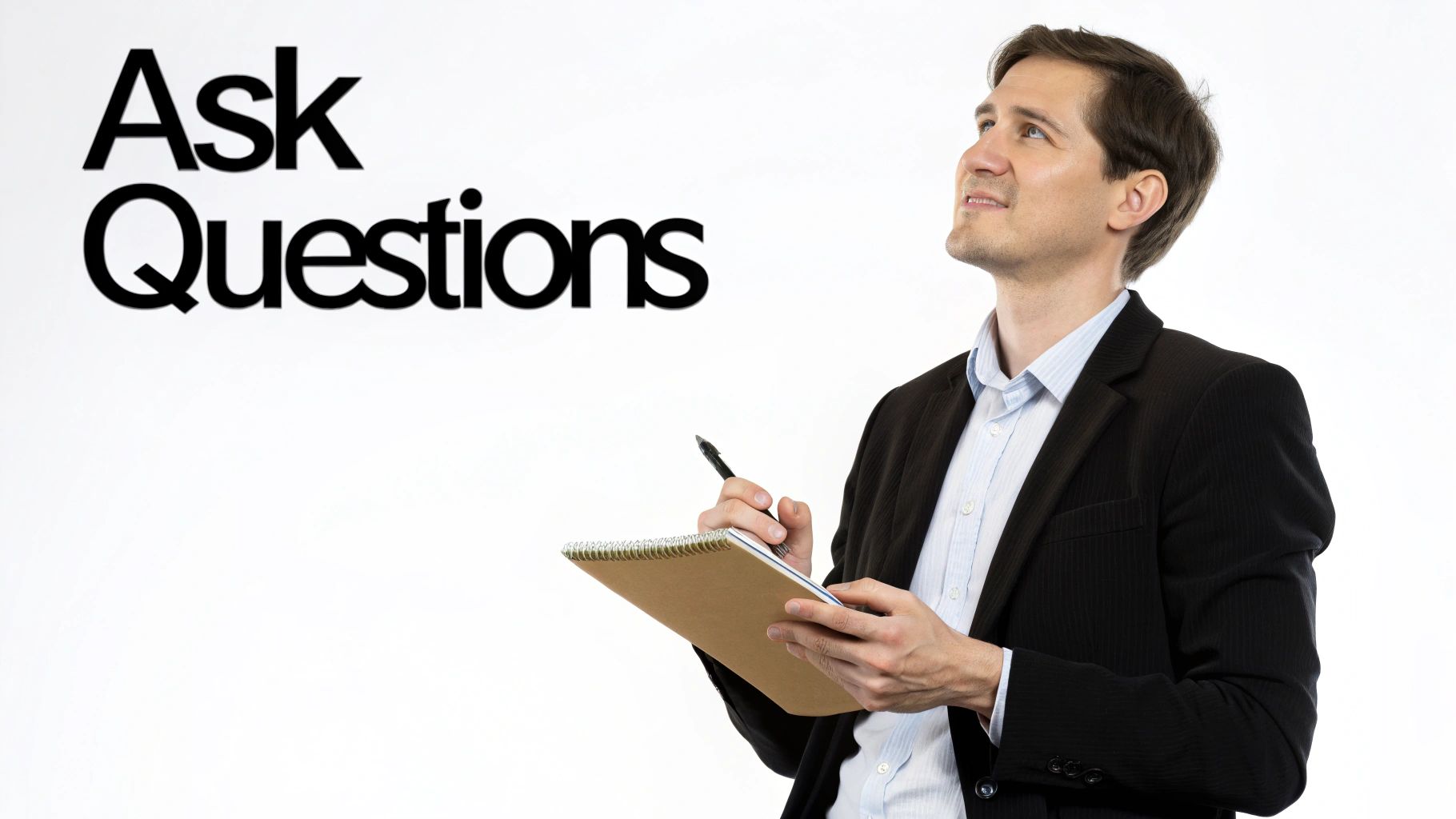
The interview isn't really over when the last question is answered. Believe it or not, the final few minutes of the call—and what you do in the hours that follow—are your last big chance to make a lasting impression. This is where you can truly stand out from the pack.
How you wrap up the conversation and your follow-up game plan can cement all the good work you've already done. It’s your opportunity to shift from just another candidate to a thoughtful, engaged professional they can see themselves working with. A clumsy ending can unfortunately sour an otherwise great interview.
Asking Insightful Questions
When the interviewer inevitably asks, "So, do you have any questions for me?" your answer needs to be a confident "Yes." This isn't just a polite formality; it's a crucial part of the interview. Showing up with zero questions can make you seem unprepared or, worse, uninterested.
You should have at least three to five smart questions ready to go. Skip anything you could have found with a quick Google search, like "What does your company do?" Your goal is to ask questions that show you've been thinking deeply about the role and your potential future there.
- Dig into the Role: Try something like, "What does a successful first 90 days in this position look like?" or "What are the biggest challenges you see someone in this role facing?"
- Understand the Team Dynamic: Ask, "Can you tell me a bit about the team I’d be working with?" or "How would you describe the management style of my direct supervisor?"
- Connect to the Bigger Picture: A great one is, "What are the company's main goals for the next year, and how does this position help achieve them?"
Questions like these prove you aren't just looking for any job—you're looking for the right one. It shows you’re evaluating them just as much as they're evaluating you.
Before you hang up, always thank the interviewer for their time and clearly restate your excitement about the opportunity. End the call on a high note—positive, professional, and confident. This final interaction is a massive part of a successful interview strategy.
Crafting the Perfect Follow-Up Email
You're not off the hook just yet. Sending a thoughtful follow-up email is absolutely essential. It’s your secret weapon for jogging the interviewer's memory and driving home your enthusiasm for the job. The sweet spot for sending it is within 24 hours of your conversation.
Keep your email short, professional, and—most importantly—personal. Hiring managers can spot a generic, copy-and-pasted message from a mile away, and it does more harm than good. A powerful follow-up has three core components:
- A Sincere Thank You: Kick things off by thanking them for their time and for the chance to discuss the role.
- A Specific Call-Back: Mention something specific you talked about. It could be a project that got you excited or a particular challenge you feel well-equipped to solve. This proves you were paying attention.
- A Final Pitch: Briefly reiterate your strong interest in the position and why you're convinced you’re the right person for the job.
If you need a little help getting the structure right, checking out some professional email example templates can show you how to put these ideas into practice. It’s a step many candidates skip, but a well-played follow-up can be the very thing that pushes you into the next round.
Answering Your Toughest Phone Interview Questions
Even when you're fully prepared, things can go sideways. A spotty connection, a missed call—these things happen. The trick is knowing how to handle these common hiccups with grace, keeping you calm and showing the interviewer you can think on your feet.
Let's walk through a few of those scenarios that can throw you off your game.
What If I Miss the Interviewer's Call?
First, don't panic. It happens to the best of us. How you react is what truly matters.
If you have their direct number, call them back right away. If not, fire off a quick, professional email immediately. Apologize once for missing the call, reiterate how much you want the job, and offer a few new times to connect. Quick action shows you're responsible and genuinely interested.
Can I Actually Use Notes During the Interview?
Yes, you absolutely should! This is one of the biggest perks of not being face-to-face. Just be smart about it. Don't write out a full script—you'll sound robotic and disconnected.
Your notes should be a safety net, not a crutch. Use bullet points to remind you of key accomplishments, interesting facts about the company, and the thoughtful questions you plan to ask. This keeps your best points front and center without losing that natural conversational feel.
How Do I Deal with a Terrible Connection?
Speak up right away. Don't try to struggle through a choppy or delayed call. You'll just end up misunderstanding a critical question or, worse, they won't hear your brilliant answer.
Just politely interrupt and say something like, "I'm so sorry, the connection is breaking up on my end. Would it be okay if I hung up and called you right back?" Taking charge of the situation is much better than pretending you can hear. It shows you're a proactive problem-solver. For more tips on mastering every stage of the interview process, you can find more in-depth guides on the ParakeetAI blog.
Ready to walk into any interview with total confidence? ParakeetAI gives you real-time, AI-powered feedback to help you answer any question like a pro. Ditch the anxiety and start making a great impression. Get started with ParakeetAI today!




